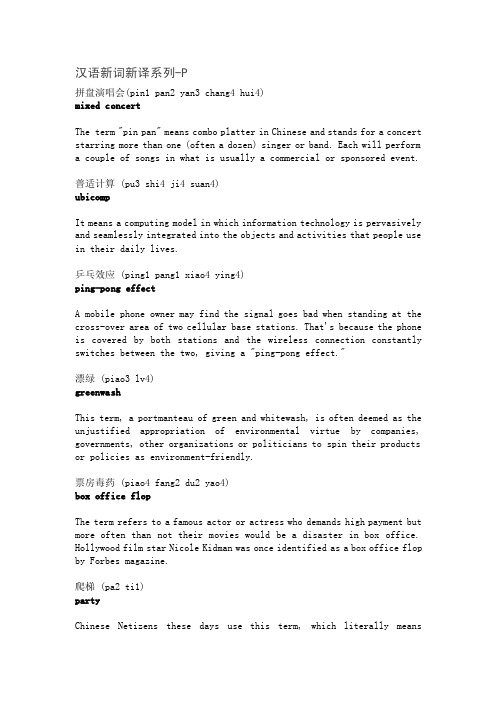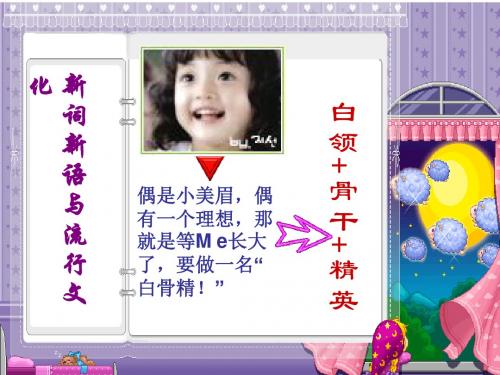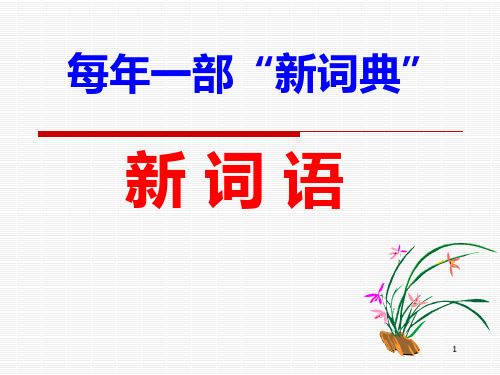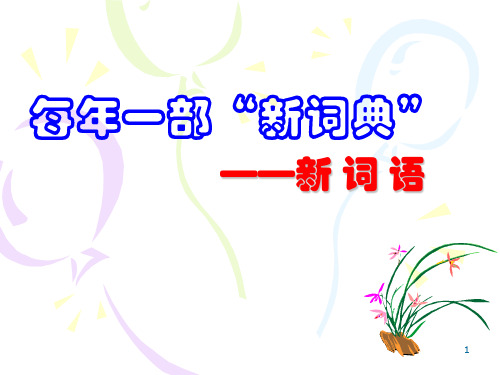新词新译.ppt
汉语新词新译系列-P

汉语新词新译系列-P拼盘演唱会(pin1 pan2 yan3 chang4 hui4)mixed concertThe term "pin pan" means combo platter in Chinese and stands for a concert starring more than one (often a dozen) singer or band. Each will perform a couple of songs in what is usually a commercial or sponsored event.普适计算 (pu3 shi4 ji4 suan4)ubicompIt means a computing model in which information technology is pervasively and seamlessly integrated into the objects and activities that people use in their daily lives.乒乓效应 (ping1 pang1 xiao4 ying4)ping-pong effectA mobile phone owner may find the signal goes bad when standing at the cross-over area of two cellular base stations. That's because the phone is covered by both stations and the wireless connection constantly switches between the two, giving a "ping-pong effect."漂绿 (piao3 lv4)greenwashThis term, a portmanteau of green and whitewash, is often deemed as the unjustified appropriation of environmental virtue by companies, governments, other organizations or politicians to spin their products or policies as environment-friendly.票房毒药 (piao4 fang2 du2 yao4)box office flopThe term refers to a famous actor or actress who demands high payment but more often than not their movies would be a disaster in box office. Hollywood film star Nicole Kidman was once identified as a box office flop by Forbes magazine.爬梯 (pa2 ti1)partyChinese Netizens these days use this term, which literally means"ladder-climbing," as a substitute expression for "party" as the Chinese expression sounds just like the English word.л型人才 (л xing2 ren2 cai2)л-type talentIt is a kind of person that has good command of two fields of professional skills as well as having expertise in management and administration. The two professional skills are the two vertical strokes while the administrative expertise is the horizontal one.泡菜 (pao4cai4)kimchiA possible origin of kimchi or Korean spicy traditional pickled vegetables was in ancient China. Recently, however, China's state food authorities have banned imports of kimchi from South Korea after finding parasite eggs in the imported side dish.拼车 (pin1che1)carpoolWhile carpooling is encouraged in many big cities around the world to tackle rush hour traffic jams and reduce pollution, some Shanghai city government departments recently drew criticism for banning the practice because it disrupted the taxi service market.漂书 (piao1shu1)bookcrossingThe practice of leaving a book in a public place to be picked up and read by others, who then do likewise, has appeared in some districts in the city.飘一族(piao1yi4zu2)drifting generationThose who give up their decent jobs to pursue their career dreams are called the drifting generation. They will move to wherever hope of dream come true is beckoning them. They live on odd jobs, mostly freelance, and live in rented houses, varying from a shabby shed way to a serviced apartment.劈腿(pi1tui3)two-timingThis term is frequently used by young people to describe someone who's not faithful to his/her spouse or lover. But a more popular Chinese saying, jiaota liangtiao chuan, portrays a two-minded person as riding on two boats simultaneously with each foot on one boat. The latter is often used in a broader sense.跑龙套(pao3long2tao4)walk-onThe term originally means a minor role in a theatrical production which usually has no speaking lines. But in daily conversations, it refers to anyone who only plays a bit role such as a utility man or a general handyman in any event, project or business.票友(piao4you3)amateur-prosIn old days, traditional Chinese opera performers were placed on the lower rungs of the social ladder. Some high-class people good at the art only performed as a hobby, rather than a way of eking out a living like professional opera singers. These days, any amateur performers who can beat pros are also referred to as a piaoyou.屏蔽门(ping2bi4men2)metro barrier doorThe city plans to install the barrier doors at 12major stations along the Metro Line 1 by the end of this year to save energy and protect the safety of passengers, particularly during the rush hours.抛绣球(pao1xiu4qiu2)throw an embroidered ballThrowing embroidered satin balls is often seen in games played by young people of minority nationalities in China. Also, a young woman may throw an embroidered ball to a young man at a ceremony as a way to choose a husband. Now it can also be used to mean an opportunity offered by someone or some organization.碰钉子(peng4ding1zi)hit a snag, get snubbedIt's painful to bump into either end of a nail. The Chinese term, meaning literally "bumping into a nail," is often used to describe the situation in which one's plan either hits the wall or gets snubbed. If you are "politely" rebuffed by others, we say you have bumped into a "soft nail."捧杀(peng3sha1)excessive praise, liberal extollmentThe Chinese term is composed of two words "praise" and "kill." When media shower excessive praise upon a person in the limelight, they unintentionally throw obstacles in the way of his or her advancement in career or simply kill their future.碰瓷帮(peng4ci2bang1)porcelain-crashing gangThe Chinese term refers to those who intentionally throw themselves onto or in front of a driving car to get compensation. The term employs the word porcelain because it's fragile and could be costly.拼一族(pin1yi1zu2)the pooling clanUrban young people in China are expanding the carpooling to Go-Dutch-type cost sharing of glossy magazines, pricey dinners, promotion coupons and whatever else they feel is too expensive if they pay alone.炮轰 (pao4hong1)bombard with criticismThe Chinese term, "bombing," is often used figuratively to describe the act of bombarding someone or some organization with criticism.盘点(pan2dian3)elaboration, rundownIt originally means stock counting. But now the term is widely used in the media to mean to cover a certain topic in an exhaustive way or to summarize the overall developments.捧车族(peng3che1zu2)car groomsSome young car owners refrain from using their vehicles whenever a bicycle will do or public transport works just as well. They make the best use of their car rather than abusing them.拍车门 (paichemen)door-tapping robberyPolice said a new form of robbery is on the rise in big cities, where a lot of cars are often trapped in traffic jams every day. Drivers might meet a friendly person knocking on their front doors when they stop at a red light or park beside the road. The person will ask the driver someordinary questions. When drivers are concentrating on talking to the person, accomplice will open the car's backdoor and snatch any valuables in the car.辟情操 (pi1qing2cao1)highbrow chatIt's quite trendy these days for young men and women to find a private place in a teahouse, bar or restaurant to chat casually on highbrow topics such as art, philosophy and human emotions. Sometimes, such talk can become quite chummy.漂婚 (piao1hun1)false marriageIt refers to the kind of extramarital affairs that takes place in a place away from the hometown of both lovers, but it takes on the appearance of a legal marriage.平价时装 (ping2jia4 shi2zhuang1)high-street fashionIt refers to those fashion brands like Zara and H&M that are popular with average-income workers for their trendy design but reasonable prices.拍书族 (pai1shu1zu2)bookstore shutterbugsThis Chinese term refers to people who take pictures of contents of new books in bookshops for their own use. Some even post such materials on the Internet to be shared by others. Now, some local bookstore owners are preparing to sue those people for "book theft."排客 (pai2ke4)paid queuerThis term refers to people who are paid to stand in a queue for others. This is a new service, particularly in the booming real estate market. In some cities, people have to queue up for a long time to buy an apartment. To save time, some buyers hire others, usually migrants from rural areas, to stand in the line for them.苹果派 (ping2guo3pai4)Apple fansThe Chinese term translates literally "apple pie," but it's often used to refer to people who are addicted to Apple's products, such as iPhone, iPod and iTunes.跑酷(pao3ku4)parkourParkour is a new sport inspired by human movement. It focuses on uninterrupted, efficient forward motion over, under, around and through obstacles especially in an urban environment. The goal of parkour is to adapt one's movement to any given obstacle.疲劳驾驶(pi2lao2 jia4shi3)drowsy drivingThe National Highway Traffic Safety Administration of the United States found that 37 percent of drivers admitted to falling asleep at the wheel at least once in their life.陪拼族(pei2pin1zu2)shopping companionThe flip side of love is that the boyfriend or husband of young women who are in the mood to shop has to keep her company all the way round, and might well drop before her shopping drags to a lengthy end.普客(pu3ke4)pook, pocket bookGuo Jingming, a young author good at writing and self-promotion, has published a series of pocket books, which he called "pooks." "Pook" has become a popular publication and a lifestyle among young Chinese readers, most of whom were born in the 1980s or 1990s.拍客(pai1ke4)photo bloggerIt refers to people who take pictures with a digital camera or cell phone and then create Web journals with these photos.排(pai2)supportThe word, which literally means "line up" in Chinese, is widely used by Internet users on bulletin boards to show their support when they agree with someone else's opinion.拼师(pin1shi1)tutor poolingSome young parents in Shanghai try to squeeze academic sessions into their children's vacation by organizing group tutoring to save the cost of hiring a private tutor.平安信(ping2an1xin4)all-is-well noteSome earthquake survivors tried to send out paper slips from cut-off areas to tell relatives they were still alive and safe.破净(po4jin4)below net asset valueStocks that have their closing price fall below their net asset value amid the current sliding stock market.破发(po4fa1)below IPO priceNowadays more and more stocks have seen their closing price on the fi rst day of trading drop below the initial price.排(pai2)agreedAt online chat rooms, Netizens use this Chinese word, meaning literally to queue or line up, to express their agreement to an opinion. It roughly means to get into the queue or stand in the same line as others.抛抛族 (pao1 pao1 zu2)public littersSome spectators at concerts or sports games have adopted the annoying and disruptive habit of littering, extending to even throwing things on stage and court. This behavior tarnishes the image of their city.陪读 (pei2 du2)student guardian/companionIn early times, this term referred to a youngster who was assigned to be a study mate for the offspring of a rich family. Nowadays, it is used to describe anyone who accompanies a child or spouse during his/her study overseas.啤酒眼 (pi1jiu3yan3)beer gogglesThrough a drunken eye, things do look different. Under the influence of alcohol, people tend to choose sex partners they would never prefer while sober. No wonder people say "beauty is in the eye of the beer holder."拍砖(pai1zhua1)knock, pick apartThe term, which literally means "smacking with a brick" in Chinese, is now widely used among Chinese Internet users when they strongly criticize someone's idea or act.拼亲 (pin1 qin1)blind-date poolingIn recent years, it has become a popular practice for young singles in large Chinese cities like Shanghai to take part in a variety of social activities designed for blind dating.贫二代 (pin2 er4 dai4)the second poor generationThe term refers to children of poor families in China who are usually very frugal and work hard to help their dependents overcome impoverished conditions. The phrase appears online in China as a result of a report saying that a freshman in the Xiangtan University in Hunan Province walked 10 kilometers to the school to save money for lunch. The term is opposite to the "second rich generation" who are usually born with a silver spoon.拼爹 (pin1 die1)hardworking fatherIt refers to a father who had a rags-to-riches story. The son, however, usually idles away time by squandering money accumulated through his father's hard work.陪拼族 (pei2 pin1 zu2)shopping palsWhere there is a woman shopping, a man is accompanying her ?and he always drops before she does.泡菜 (pao4 cai4)posting-reading addictIt refers to people who spend a lot of time reading postings in online chatrooms. The Chinese expression literally means kimchi, but the word 泡, when used as a verb, also means to be immersed or deeply engaged in doing something.碰出火花 (peng 4 chu1 huo3 hua1)chemistryWhen a man and woman discover the spinetingling feeling of attraction at the same time, they are said to have tapped the romantic combination of chemistry. The Chinese literally means to "strike sparkles" of love. 拼爹游戏 (pin1 die1 you2 xi4)competition of family backgroundSome young people of poor families who are usually very frugal and work hard to help their dependents overcome impoverished conditions complain that they are currently being judged in society on their family background rather than capability and knowledge. They believe the children of rich families, known as the "second rich generation," can always get decent jobs and social status ahead of the poor.帕克 (pa4 ke4)handkerchief advocatorThe Chinese term became popular after China's online messaging service provider Tencent launched a handkerchief design campaign last year to encourage the use of handkerchiefs to protect the environment. The winner will be called a 帕客 or a "handkerchief advocator," as it refers to green consumers who prefer to use handkerchiefs instead of throw-away paper tissues in support of low-carbon life.。
每年一部“新词典”——新词语PPT3

•
9、照自己的意思去理解自己,不要小看自己,被别人的意见引入歧途。
•
10、没人能让我输,除非我不想赢!
•
11、花开不是为了花落,而是为了开的更加灿烂。
•
12、随随便便浪费的时间,再也不能赢回来。
•
13、不管从什么时候开始,重要的是开始以后不要停止;不管在什么时候结束,重要的是结束以后不要后悔。
•
14、当你决定坚持一件事情,全世界都会为你让路。
•
4、一切伟大的行动和思想,都有一个微不足道的开始。
•
5、从来不跌倒不算光彩,每次跌倒后能再站起来,才是最大的荣耀。
•
6、这个世界到处充满着不公平,我们能做的不仅仅是接受,还要试着做一些反抗。
•
7、一个最困苦、最卑贱、最为命运所屈辱的人,只要还抱有希望,便无所怨惧。
•
8、有些人,因为陪你走的时间长了,你便淡然了,其实是他们给你撑起了生命的天空;有些人,分开了,就忘了吧,残缺是一种大美。
•
20、不忘初心,方得始终。
1.2进入日常词汇而保 留下来。
2.如:互联网、盗版等。
五、新词新语与流行文化。
1、科学技术的进步和社会生活的 变化是新词新语产生的源泉,新 词新语又是反映新时代、新生活 的一面镜子。如:黄金周、按揭。
2、新词新语也是流行文化的 “晴雨表”和“温度计”。如: 大片、韩流、新新人类等。
新词新语的特点就是新。
六 、
用的时间短,用的人少, 有些词语还包含着许多创 造,虽然有时我们对它还
课 不咋么熟悉,使用时可能
堂 小
不大好懂,但我们不能拿 一些人不懂来指责它,要 以特别宽容的态度来学习
结 它,了解它,从中感知时
每年一部“新词典”――新词语(PPT课件

三是香港粤语词,如“大排档、减肥、爆 满”等;
14
美食博览会
泡芙:来自英语“puff”。 “巧克力”:来自英语“chocolate”; “沙拉”:来自英语“salad”; “派”:来自英语“pie”; 比萨饼”:来自于英语“pizza”; “汉堡包”:来自于德语“hamburger”; “果酱”:来自于英语“jam”。 “可口可乐”:来自英语“coca-cola”; “百事可乐”:来自英语“pepsi-cola”。15
3.变化不大的词语主要是服务用语,原因是不管 过去还是现在,对顾客的尊敬是没有变化的。
根本原因:社会发展 6
新词语产生的根源:社会的发展变化
20世纪80年代流行语:中国特色、倒爷、万元户、 迪斯科、平反、顶职、“一号文件” 20世纪90年代初流行语:下海、申办奥运、发、大 哥大、第二职业、电脑、没商量、说法、发烧友 20世纪90中后期流行语:下岗、再就业、泰坦尼克、 哇噻、帅呆了、美女作家、黑哨、知识经济、打假 本世纪初流行语: 911、本·拉登、申奥、入世、 WTO、出线、QQ、反恐、flash 近五年流行语:廉租住房制度、和谐社会、物权法、 铁路提速、神舟六号、八荣八耻、侵权、非典
意,现指保持原来的水平。原来的意义消失了,
代之以新的含义。
12
▲外来词--吸收方言词语
作为新词语的方言词,指本来只在方言地区通行,进 入共同语不久,并且被全社会接受和使用比较广泛的 词。像来自吴方言的“断档、发嗲”等,来自粤方言 的“看好、靓丽、老公、买单(粤语作“埋单”)、 第一时间”等,就是来自方言的新词语。
▲外来词---吸收外来词语
(1)纯粹音译。
新词新语PPT总篇。

一、政治方面
粉碎“四人帮”之后,虽然结束了“文化大革命”,但中国社会仍然 处于在徘徊中前进的阶段,“两个凡是”的阴影还窒息着国家和民族的 生机,为了冲破思想禁区,彻底从“左”的路线中挣脱出来,邓小平等 领导人提出了“实事求是”的方针,展开了真理标准问题的大讨论,平 反了冤假错案,尤其是党的十一届三中全会,重新确立了“实事求是” 的思想路线,确定了以经济为中心的政治路线,开创实行改革开放的新 道路。20年前中国社会的政治变革,以及变革中出现的新事物、新概念 都以新词新语的形式保留下来,通过这些新词新语,我们仿佛又看到了 当时的社会图景。 例如:两个凡是、清“左”、两个坚持、向前看、改革开放、新时期、 四项基本原则、治理整顿、长治久安、冤假错案、拨乱反正、三不主义
例如:茶文化、大文化、烟文化、酒文化、美食文化、服饰 文化、婚姻文化、企业文化、校园文化、宿舍文化
(二)有关文学艺术方面的 改革开放以来,我国的文学艺术事业得 到空前发展,新词新语中有许多词语记录了 文学艺术领域出现的新事物、新概念,尤其 是突出表现了文学艺术形式的多样性。
例如:探索片、知青文学、室内剧、笑 星、歌星、舞星
共变的过程表现一定的不平衡性: 第一,就共变的两个变量——语言和社会的关系看,社 会是第 一性的,语言是第二性的,因为只有社会的变化,才 能引起语言的变化; 第二,就语言的变化情况看,语言各要素的变化速度、 变化程度也是不平衡的,语音和语法的变化较慢,而词汇是 最活跃的,是变化最快的要素,社会生活的任何变化,即便 是最微小的变化,也会反映在词汇系统中,而词汇变化最主 要的形式就是出现大量的新词新语,尤其当社会结构、社会 生活发生急剧变化时,与之共变的语言便以产生大量新词新 语作为变化的主要特征。
例如:普九、教师节、希望工程、博士后、减 负
每年一部新词典――新词语PPT课件

3.对于网络中出现的生造词,应加以抵制。
PLMM、MM、GG、KL、PY、BT
12
1、眼下许多深圳的年轻人开始过上了“小私” 生活。
2、新近冒出的“小私”一族,即拥有自己的私 人理发师、私人营养师、私人健身教练、私人 购衣指导等等,只要价格能接受,什么都可以 “私”。
所谓小私就是指可以享受专业化的私人服务为 主要特征的新兴社会群体及其生活方式。
9
• 哪能如此杂交?
张先生大笑道:“我不懂什么年代花纹,事情忙,也 没工夫翻书研究。可是我有hunch;看见一件东西,忽然 what d‘ you call灵机一动,买来准OK.。他们古董掮客都佩 服我,我常对他们说:‘不用拿假货来fool我。 O yeah,我 姓张的不是sucker,休想骗我!’”关上橱门,又说:“咦, headache--”便捺电铃叫用人。
粉丝、伊妹儿 可口可乐、巧克力、克隆、奥林匹克
足球、新西兰、啤酒、因特网、卡车、复印、 UFO、MTV、CD、WTO、KTV、DVD
5.词语缩略和衍生
*高考---全国普通高等学校统一招生考试
央行---中国人民银行
课改---课程改革
环保---环境保护
家教---家庭教师
春晚---春节联欢晚会
6
海归、体彩、维和、物流、卫视、婚介、奥申委 央视、世博会、两个文明、五讲四美、三个代表
空气质量、和谐社会、丁克家庭;
4
• 新词语产生
2.旧词新用
访问、浏览、菜单、楼上楼下、杀手、漫游、 出台、变脸、接轨、票房、磨合、外援
3.来自方言
买单、炒鱿鱼、楼盘、按揭、搞定、 写字楼、看好、物业、运作、资深、 连锁店、传媒、共识、认同 靓丽、第一时间、忽悠、大腕儿
翻译新词热词PPT课件

Thank s
第28页/共29页
感谢您的观看!
第29页/共29页
loneliness。
第21页/共29页
2.音译法 音译法是一种在译文中找到与之相似发音的 字或词。这种译法一般不强调词本身的意义, 而是通过保留原文的音韵美,听起来洋味十 足,充满异国情调,新颖别致,迎合消费者 标新立异的心理。 例如: “双规(shuanggui)”、“劳改 (laogai)”、“城管(chengguan)”、 “户口 (hukou)”、“茅台 (maotai)”、 “福娃 (fuwa)”、“海宝(haibao)
第18页/共29页
(六)由汉语意思意译而来的网络新词 热词。
例如: 1. 坑爹 the reverse of one 's expectation ,“坑爹 ”意思并不是真 的把爹给坑了 ,而是 “坑人欺骗、不尽 人意”的意思。
第19页/共29页
(七)由中式英语翻译而来。 1.不作就不会死 No zuo, no die.这
有些网络新词热词使用中文和英语混杂的方法。 例如: 给 力 gelivable(反 义词 :不给力 ungeliv-able),形容词。 含义是“令人激动的,使人兴高采烈的”. 该词是汉语拼音 “gei li”和英语后缀-able 的组合。
第15页/共29页
(四)运用英语构词法创造的单词 英语构词法主要有:转化法、派生
法、合成法、混合法(拼缀法)、截短 法和首字母缩略法等。
1.拼缀法(blending) 即将原来的 两个或多个词组合在一起, 并在合成时 进行裁剪或缩略, 一个词或者各个词都 失去部分音节后连 接成一个新词。
例如: 低头族 Phubber 是 phone (电话)和 snub(冷落,怠慢)的组合。
《新词语的翻译》PPT课件

B. 以拉丁字母表达形象 Y-connection Y形连接 X-tube X形管 U-pipe U形管 Z-beam Z字梁 A- frame A形架 C-washer C形垫圈 O-ring O形环
C. 借用物体形象 T-track 锤形轨迹 U-bolt 马蹄螺栓 V-belt 三角带 set square 三角板 clamp 弓形卡 U-steel 槽钢 Y-pipe 叉形管 X-type 叉形
China aster 翠菊 China berry 株树 China grass 芒麻 China ink 墨 China orange 橙 China plate 好友 China rose 月季 China stone 做瓷器的矿物〔如瓷土或白墩子〕 Chinese calendar 农历 Chinese copy 与原物一模一样的复制品 Chinese dragon 腆磷 Chinese lantern 灯笼 Chinese puzzle 难答之事
2. 缩略语和全称并存的问题 随着人们生活节奏的加快,汉语中出现的新词都有音节数目趋简的趋势〔邹嘉彦,游汝杰,2003:17〕.因此,缩略语便在汉语新词中熠熠生辉.如今年上半年肆虐全国的"非典",从最开始被命名为"传染性非典型性肺炎"到稍后的"非典型性肺炎",到最后被人们习惯性称作"非典",以及中央电视台的新闻联播中把"防汛抗旱总指挥部"简称为"防总",都可看出新词语中缩略语的威力.汉语如此,英语更是如此. 汉语中就直接借用了很多英语中的缩略语,如"MTV, CD, CPU,PPA"等.《新华新词语词典》对有些词条的译文既给出了缩略语形式,也给出了全称,如在"艾滋病"、"高清晰电视"词条下就分别有"AIDS,acquired immune deficiency syndrome"和"HDTV, high definition TV"两种形式;在有的词条下却只给出了全称,如"非处方药"词条下只有"over the counter medicine", 却没有现在很多药品包装盒上都赫然印有的缩略语 "OTC".笔者以为,既然缩略语的使用符合人们求新、求变、求异、求简的心理〔余富林,2002:253〕,那么,当汉语新词语的英文对等词存在缩略语时,缩略语应列为首选.
《新词新语与流行文化》ppt

探究(四)如何正确使用新词新语?
1、注意对象 2、注意场合 3、注意语体 4、作文中适当使用
高考阅卷老师也指出不提倡学生在高考作文中使 用新词酷语,考试要求学生使用规范语言,如果 这种新词过多的话,可能会影响阅卷老师的阅读 理解。只有那些适应社会需求,被广泛接受,语 义明确相对稳定的新词,或者特定环境下刻画人 物必须情况下,才能使用,绝不能刻意追求使用 新词,否则很容易弄巧成拙,这是我们所有学生 务必谨记的一点!
课堂练习
1、选词填空:
不久前台湾歌手依林宣传新碟时称,
(A、销售的数量 B、销量)已突破15万张。
周杰伦随即(A、强烈谴责 B、炮轰)其唱片公
司
(A、居于上层的领导人物 B、高层)
为了扩大影响而
(A、夸大销售数字 B、
作假)。日前个性特立独行的周杰伦再度放炮,
主动公布自己的唱片实际预购量,并痛批台湾唱
片界对销售量
(A、虚夸数字 B、灌水)
的恶习。
原因:形象生动、方便简洁、富有时代气息
2.小婷上学时在小区门口碰上隔壁王奶奶,热情地打招呼: “王奶奶,您早恋(早晨锻炼)回来了?我发现您最近巨 靓(很美丽),简直就是骨灰级(的美女)好养眼(好看) 哦!”王奶奶愣在原地半天。 问:你觉得小婷的新词新语用得合适吗?为什么?
雪藏的意思是:①搁置不用 ③隐没无闻
②有意隐藏
作业
以“总有一些词语让我难以忘 怀”为题,写一篇小论文,探究 词语与文化的关系。
• 新词新语产生的原因:
• 一、社会原因:
• 1、高科技 如3G、4G(手机)漫游
• 2、快节奏 如奔奔族、蚁族
• 3、新事物 如义工 特首
• 4、其他
如领导
